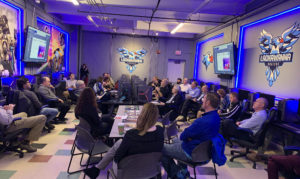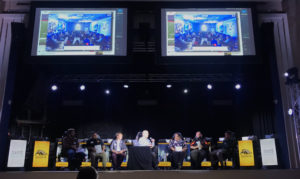 “To truly appreciate esports it is imperative to experience a space such as Western Michigan University’s gaming arena.”
“To truly appreciate esports it is imperative to experience a space such as Western Michigan University’s gaming arena.”
Joe Rommel, Berrien Regional Education Services Agency (RESA)
Educational Technology Consultant (also MACUL president 2019-2020)
On November 4th, 2019 Merit hosted a second community meeting at the WMU Esports Arena in The Little Theatre to discuss the dynamic growth of esports programs across Michigan’s higher ed and K-12 campuses.
48 in-person participants included representatives from a wide variety of Merit Member organizations from across the state. Additionally, the 45 remote participants included a contingent from Pennsylvania, courtesy of KINBER (the research & education network for Pennsylvania) and Lackawanna College.
The day’s events included a variety of community presentations, a panel discussion, peer-to-peer networking, an exploration of future collaboration opportunities, as well as a demonstration of the WMU Esports Arena in action.


The event program included:
A K-12 Panel Discussion with:
- Dawn Everett, Bangor Schools
- Eric Wheeler, a high school Senior and gamer at Bangor Schools
- Zach Garner, Perry Public Schools, MiHSEF
- Ian Haight, Paw Paw Public Schools, Southwest Michigan esports League
- Dylan Chapman, Grass Lake Community Schools
- Jeff Bennett, Charlotte Public Schools
The panel addressed many frequently asked questions surrounding esports, including its origins, comparisons to traditional sports, the discovery of new challenges and benefits, and the steps necessary for interested organizations to develop esports within their own communities.
“Esports 101” – a proposal for an educational program to get schools started in esports, presented by Scott Puckett, Senior Director of Information Technology & Michael Sisk, Assistant Director of Information Technology, Western Michigan University (and co-creators of WMU esports).Scott discussed implementing esports within your own institution, starting from finding staff and faculty that are passionate about gaming, then reviewing project budgets and program support to finally measuring the success of an esports program utilizing grades, retention, and recruitment. Scott is also considering turning this into a formal educational program if there is enough interest.
Gamer’s Outreach: Gamers for Giving – Brian Leitson, Divisional Technology Specialist II at Eastern Michigan University (and also representing Gamer’s Outreach), presented on Gamers For Giving and the impact their incredible work has on the community. Each year, Gamers Outreach hosts a fundraising event called Gamers for Giving. Since its inception in 2008, it has become one of the largest LAN parties in North America. Ticket sales and donations received from streamed broadcasts help fund Gamers Outreach programs year-to-year. Project GO Kart, which creates gaming kiosks that enable nurses to easily provide bedside activities to children unable to leave their room in hospitals, and Player 2, an initiative that pairs video game enthusiasts with volunteer positions in hospitals, are only two of many of these programs.
Gamer’s Outreach raised an incredible $772,000 in 2019.
Learn more and get involved: https://gamersforgiving.org
The Student Perspective of WMU’s Esports Club – presented by Trevor Cwiek, student president of Western Michigan University’s esports club team. This discussion explored how to build and operate an academic esports program, all from the student’s point of view. Speaking from the WMU perspective on developing their own esports program and arena, Trevor discussed the need for a framework, a solid foundation, the essentials, and the challenges WMU faced in the process.
Launching a Thriving Esports Program: Lessons from a Small Northeastern PA College – presented by Teddy Delaney, Esports Program Administrator, Lackawanna College.
Teddy gave a great overview of what it takes to launch a new collegiate esports program. Among the highlights were these video clips produced by Lackawanna to promote its program:
- Program Announcement – https://www.youtube.com/watch?v=4jJtAGkAdoo&t=1s
- Facility Tour – https://www.youtube.com/watch?v=upVqe7XJci8
- Equipment Unboxing – https://www.youtube.com/watch?v=bKQ1mBCwHMQ
- Team Highlights – https://www.youtube.com/watch?v=l33S2F77x1I
Esports Arena Demonstration: After the presentations were complete, WMU Esports set up an exhibition match of Rocket League to show off the capabilities of the arena. Volunteers from the crowd were seated on stage with full gaming rigs and gamer tags on-display. With lights flashing and the music booming, the match was underway. Trevor Cweik returned to shoutcast the match, which was streamed live on WMU’s Twitch channel (https://www.twitch.tv/thewmuesports).
Twitter coverage was lively, with participants using the #esportsEDU19 hashtag throughout the day. You can view tweets from the event here: https://twitter.com/hashtag/esportsedu19
So what’s next for Merit in the esports realm? The ensuing discussion revolved around ways that Merit can boost the success of its Members’ esports programs, with possible ideas including:
- Formalizing an esports Community of Practice
- Network optimization
- Formalized esports recruiting combines
- And other ideas were forwarded by Members, as well
As a follow-up, Merit has asked its members to voice their opinions on esports-related programs that will provide the best value, via a short survey. Merit’s Product Team is seeking survey input until December 31, 2019, and will then plan to develop more popular concepts.
Merit is always seeking Members to collaborate on technical innovations to enhance the esports experience. Reach out to David Dennis ([email protected]) to connect!